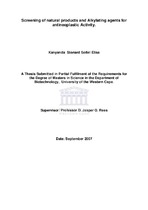Screening of natural products and alkylating agents for antineoplastic activity
Abstract
Background and objectives: Apoptosis is a process in which a cell programmes its own death. It is a highly organized physiological mechanism in which injured or damaged cells are destroyed. Apart from physiological stimuli however, exogenous factors can induce apoptosis. Many anti-cancer drugs work by activating apoptosis in cancer cells. Natural substances have been found to have the ability to induce apoptosis in various tumour cells and these substances have been used as templates for the construction of novel lead compounds in anticancer treatment. On the other hand, alkylating agents such as cisplatin, cis- [PtCl2 (NH3) 2] have been widely used as antineoplastic agents for a wide variety of cancers including testicular, ovarian, neck and head cancers, amongst others. However, the use of cisplatin as an anticancer agent is limited due to toxicity and resistance problems. The aim of this present study was to screen the leaves of Rhus laevigata, a South African indigenous plant, for the presence of pro-apoptotic and anti-proliferative natural compounds and also to screen newly synthesised palladium based complexes (15 and 57) and a platinum based complex (58) for their antineoplastic activities tested against a panel of cell lines. Results. The results showed that crude methanol extracts from Rhus laevigata as well as the newly synthesised palladium based complexes (15 and 57) and a platinum based complex (58) induced apoptosis in the cell lines tested, as demonstrated by the externalization of phosphatidylserine, mitochondrial membrane permeabilization,caspase-3 activation, and DNA fragmentation. Caski (cervical cancer) and H157 (non small cell lung carcinoma) cell lines treated with the methanol extract from Rhus laevigata however, were more resistant to apoptosis induction. Among the metallocomplexes, complexes 15 and 57, palladium based complexes, were the most active. Conclusion: The methanol extract from the leaves of Rhus laevigata contain pro-apoptotic and antiproliferative natural compound(s), which need to be characterised and elucidated as they could provide the much-needed lead compounds in the fight against cancer. On the other hand the newly synthesized palladium complexes also need further evaluation to see if they can be used as anticancer agents that can overcome the problems associated with cisplatin.

